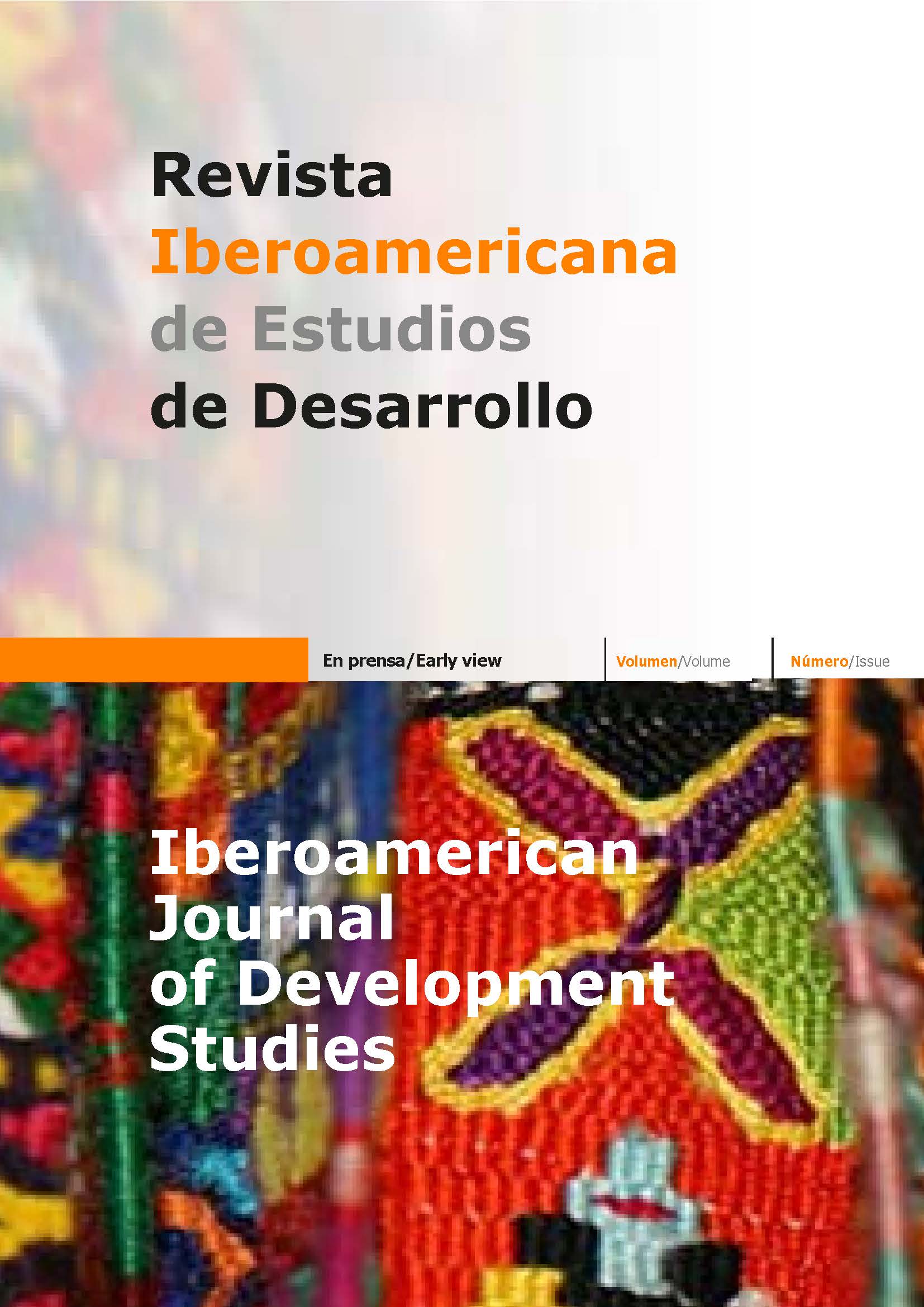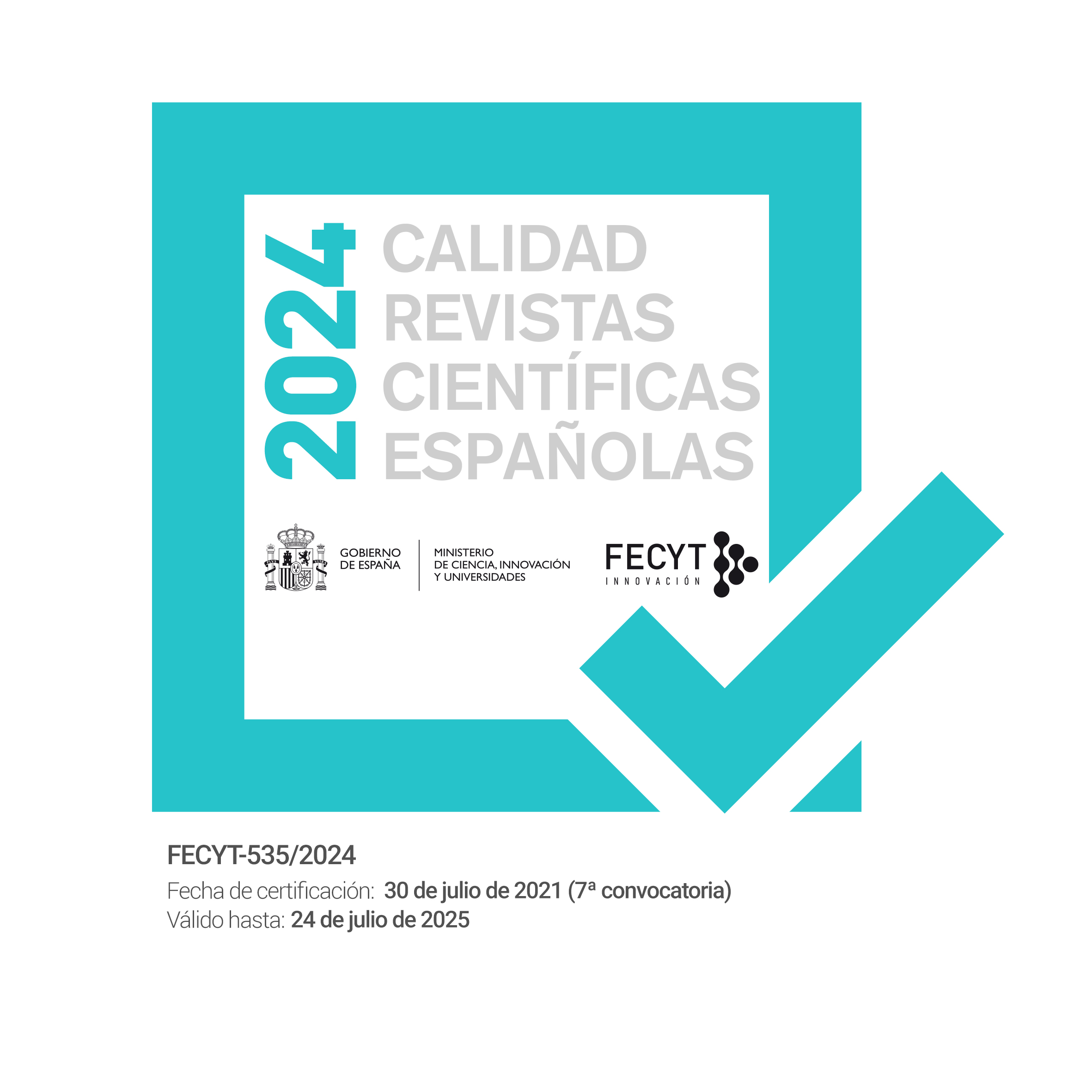The role of the state in contemporary processes of late-late development. A diagnosis of the Ethiopian experience to illustrate a renewed debate
DOI:
https://doi.org/10.26754/ojs_ried/ijds.9990Keywords:
development state, late-late development, EthiopiaAbstract
Recent economic performance in Ethiopia has revived research on the role of the state in development processes. Assessing the relevance of the Ethiopian experience provides valuable insights to the discussion on the scope and limits of state action in other contemporary development experiences. This paper presents a case study based on elite interviews conducted during fieldwork in Ethiopia. The results of our research suggest that, while it is possible to argue that the Ethiopian state acquired developmentalist traits during the period 1994-2015, the characterisation of the state as «developmentalist» was used to sustain Meles Zenawi’s personalist political project. In Ethiopia, state-led development was not just an economic strategy aimed at structural transformation, but rather a means to maintain power.
Downloads
References
AALEN L, TRONVOLL K (2009). The End of Democracy? Curtailing Political and Civil Rights in Ethiopia. Review of African Political Economy 36(120):193-207. DOI: https://doi.org/10.1080/03056240903065067
AARON TESFAYE (2017). State and Development in Ethiopia. State and Economic Development in Africa. The Case of Ethiopia. Palgrave Macmillan, Cham, pp. 39-64. DOI: https://doi.org/10.1007/978-3-319-57825-5_2
ABBINK J (1995). Breaking and Making the State: The Dynamics of Ethnic Democracy in Ethiopia. Journal of Contemporary African Studies 13(2):149-163. DOI: https://doi.org/10.1080/02589009508729570
ALEMAYEHU GEDA (2023). Crony Capitalism through the «Developmental State» Model of Ethiopia: An Identification of its Main Manifestations. Economic Research Forum Working Paper No. 1634.
AMSDEN AH (1992). A theory of Government Intervention in Late Industrialization. In: Putterman L, Rueschemeyer D. State and Market in Development: Synergy or Rivalry? Lynne Reiner, London, pp. 53-84. DOI: https://doi.org/10.1515/9781685856342-007
ARKEBE OQUBAY (2019). Industrial Policy and Late Industrialization in Ethiopia. In: Fantu Cheru, Cramer C, Arkebe Oqubay. The Oxford Handbook of the Ethiopian Economy, Oxford University Press, Oxford, pp. 605-629. DOI: https://doi.org/10.1093/oxfordhb/9780198814986.013.31
AUSTIN G (2015). Is Africa too late for «late development»? Gerschenkron south of the Sahara. African Economic History Working Paper Series 23/2015. African Economic History Network (AEHN).
BACH JN (2011). Abyotawi Democracy: Neither Revolutionary nor Democratic, a Critical Review of EPRDF’s Conception of Revolutionary Democracy in post-1991 Ethiopia. Journal of Eastern African Studies 5(4):641-663. DOI: https://doi.org/10.1080/17531055.2011.642522
BEAMER G (2002). Elite Interviews and State Politics Research. State Politics & Policy Quarterly 2(1):86-96. DOI: https://doi.org/10.1177/153244000200200106
BRAUTIGAM D, WEIS T, TANG X (2018). Latent advantage, complex challenges: Industrial policy and Chinese linkages in Ethiopia’s leather sector. China Economic Review 48:158-169. DOI: https://doi.org/10.1016/j.chieco.2016.06.006
CALLAGHY TM (1987). The State as Lame Leviathan: The Patrimonial Administrative State in Africa. In: Ergas Z. The African State in Transition. Palgrave Macmillan, London, pp. 87-116. DOI: https://doi.org/10.1007/978-1-349-18886-4_5
CHINIGÒ D, FANTINI E (2015). Thermidor in Ethiopia? Agrarian Transformations between Economic Liberalization and the Developmental State. EchoGéo 31:1-16. DOI: https://doi.org/10.4000/echogeo.14141
CLAPHAM C (2006). Ethiopian Development: The Politics of Emulation. Commonwealth and Comparative Politics 44(1):108-118. DOI: https://doi.org/10.1080/14662040600624502
CLAPHAM C (2009). Post-war Ethiopia: The Trajectories of Crisis. Review of African Political Economy 36(120):181-192. DOI: https://doi.org/10.1080/03056240903064953
CORBIN J, STRAUSS A (1990). Grounded Theory Research: Procedures, Canons, and Evaluative Criteria. Qualitative Sociology 13(1):3-19. DOI: https://doi.org/10.1007/BF00988593
CRAMER C, SENDER J, ARKEBE OQUBAY (2020). African Economic Development. Evidence, Theory, Policy. Oxford University Press, Oxford. DOI: https://doi.org/10.1093/oso/9780198832331.001.0001
CRESWELL JW, CRESWELL JD (2018). Research Design. Qualitative, Quantitative, and Mixed Methods Approaches, 5th ed. Sage Publications, London.
DE WAAL A (2013a). Review Article. The Theory and Practice of Meles Zenawi. African Affairs 112(446):148-155. DOI: https://doi.org/10.1093/afraf/ads081
DE WAAL A (2013b). The Theory and Practice of Meles Zenawi – A Reply to René Lefort. African Affairs 112(448):471-475. DOI: https://doi.org/10.1093/afraf/adt022
DE WAAL A (2018). The Future of Ethiopia: Developmental State or Political Marketplace? World Peace Foundation Working Paper. Tufts University, Boston.
DESSALEGN RAHMATO (2008b). Ethiopia: Agriculture Policy Review. Taye Assefa. Digest of Ethiopia’s National Policies, Strategies and Programs. Forum for Social Studies, Addis Ababa, pp. 129-152.
ETHIOPIAN PEOPLE’S REVOLUTIONARY DEMOCRATIC FRONT, EPRDF (2012). Ethiopian People’s Revolutionary Democratic Front Program. EPDRF, Addis Ababa.
EVANS PB (1989). Predatory, Developmental, and Other Apparatuses: A Comparative Political Economy Perspective on the Third World State. Sociological Forum 4(4):561-587. DOI: https://doi.org/10.1007/BF01115064
EVANS PB (1995). Embedded Autonomy: States and Industrial Transformation. Princeton University Press, Princeton. DOI: https://doi.org/10.1515/9781400821723
FANTU CHERU, ARKEBE OQUBAY (2019). Catalysing China-Africa Ties for Africa’s Structural Transformation. Lessons from Ethiopia. Arkebe Oqubay and Yifu Lin. Oxford University Press, Oxford, pp. 282-309. DOI: https://doi.org/10.1093/oso/9780198830504.003.0014
GERSCHENKRON A (1962). Economic Backwardness in Historical Perspective. The Belknap Press of Hardvard University Press, Cambridge.
GILL S (1995). Globalisation, Market Civilisation, and Disciplinary Neoliberalism. Millennium 24(3):399-423. DOI: https://doi.org/10.1177/03058298950240030801
GRACIARENA J (1976). Poder y estilos de desarrollo. Una perspectiva heterodoxa. Revista de la Cepal 1:173-194. DOI: https://doi.org/10.18356/b25f9916-es
HAGMANN T AND ABBINK J (2011). Twenty Years of Revolutionary Democratic Ethiopia, 1991 to 2011. Journal of Eastern African Studies 5(4): 579-595. DOI: https://doi.org/10.1080/17531055.2011.642515
HARRISON G (2010). Neoliberal Africa: The Impact of Global Social Engineering. Zed Books, London. DOI: https://doi.org/10.5040/9781350221499
HARVEY WS (2010). Methodological Approaches for Interviewing Elites. Geography Compass 4(33):193-205. DOI: https://doi.org/10.1111/j.1749-8198.2009.00313.x
HARVEY WS (2011). Strategies for Conducting Elite Interviews. Qualitative Research 11(4):431-441. DOI: https://doi.org/10.1177/1468794111404329
HAUGE G, CHANG HJ (2019). The Concept of a «Developmental State» in Ethiopia. In: Fantu Cheru, Cramer C, Arkebe Oqubay. The Oxford Handbook of the Ethiopian Economy. Oxford University Press, Oxford, pp. 824-841. DOI: https://doi.org/10.1093/oxfordhb/9780198814986.013.43
HERBST J (2000). States and Power in Africa: Comparative Lessons in Authority and Control. Princeton University Press, Princeton.
HICKEY S (2023). Pockets of Effectiveness and the Politics of State-building and Development in Africa. Oxford University Press, Oxford. DOI: https://doi.org/10.1093/oso/9780192864963.001.0001
JOHNSON C (1982). MITI and the Japanese Miracle. The Growth of Industrial Policy, 1925-1975. Stanford University Press, Redwood City. DOI: https://doi.org/10.1515/9780804765602
JOHNSON C (1999). The Developmental State: Odyssey of a Concept. In: Woo-Cummings M. The Developmental State. Cornell University Press, Cornell.
JUHÁSZ R, LANE N, RODRIK D (2023). The New Economics of Industrial Policy. Working Paper. https://drodrik.scholar.harvard.edu/sites/scholar.harvard.edu/files/dani-rodrik/files/the_new_economics_of_ip_080123.pdf, access September 1, 2023. DOI: https://doi.org/10.3386/w31538
KOHLI A (2004). State-Directed Development. Political Power and Industrialization in the Global Periphery. Cambridge University Press, Cambridge. DOI: https://doi.org/10.1017/CBO9780511754371
LAVERS T (2023). Ethiopia’s «Developmental State». Political Order and Distributive Crisis. Cambridge University Press, Cambridge. DOI: https://doi.org/10.1017/9781009428316
LEFORT R (2012). Free Market Economy, «Developmental State» and Party-State Hegemony in Ethiopia: The Case of the «Model Farmers». The Journal of Modern African Studies 50:681-706. DOI: https://doi.org/10.1017/S0022278X12000389
LEFORT R (2013). The Theory and Practice of Meles Zenawi: A Response to Alex de Waal. African Affairs 112(448):460-470. DOI: https://doi.org/10.1093/afraf/adt021
LIU X (2018). Interviewing Elites: Methodological Issues Confronting a Novice. International Journal of Qualitative Methods 17:1-9. DOI: https://doi.org/10.1177/1609406918770323
MANN M (1984). The Autonomous Power of the State: Its Origins, Mechanisms and Results. European Journal of Sociology 25(2):185-213. DOI: https://doi.org/10.1017/S0003975600004239
MARKAKIS J (2011). Ethiopia: The Last Two Frontiers. James Currey, New York.
MARTINS P (2014). Structural Change in Ethiopia. An Employment Perspective. Policy Research Working Paper 6749. World Bank’s Poverty Reduction and Economic Management Department. The World Bank, Washington, D. C. DOI: https://doi.org/10.1596/1813-9450-6749
MAZZUCATO M (2013). The Entrepreneurial State: Debunking Public vs. Private Sector Myths. Anthem Press, London.
MELES ZENAWI (2006). African Development: Dead Ends and New Beginnings Unpublished manuscript, Addis Ababa.
MILES MB, HUBERMAN AM (1994). Qualitative Data Analysis, 2nd ed. Sage Publications, London.
MINISTRY OF FINANCE AND ECONOMIC DEVELOPMENT, MoFED (2003). Rural Development Policy and Strategies. Ministry of Finance and Economic Development, Addis Ababa.
MKANDAWIRE T (2001). Thinking about Developmental States in Africa. Cambridge Journal of Economics 25(3):289-313. DOI: https://doi.org/10.1093/cje/25.3.289
MKANDAWIRE T (2014). The Spread of Economic Doctrines and Policymaking in Postcolonial Africa. African Studies Review 57(1):171-198. DOI: https://doi.org/10.1017/asr.2014.12
NALLET C (2015). Classes moyennes éthiopiennes. Étude empirique d’une assignation catégorielle incertaine. Doctoral thesis, Université de Bourdeaux.
PINTO A (1976). Notas sobre los estilos de desarrollo en América Latina. Revista de la Cepal 1:97-128. DOI: https://doi.org/10.18356/07a6ef84-es
PLANEL S (2016). Le developmental state éthiopien et les paysans pauvres. Économie politique du développement rural par le bas. Politique africaine 2(142):57-76. DOI: https://doi.org/10.3917/polaf.142.0057
RODRIK D, STIGLITZ JE (2024). A New Growth Strategy for Developing Nations. IEA-ERIA Project on the New Global Economic Order. https://drodrik.scholar.harvard.edu/sites/scholar.harvard.edu/files/dani-rodrik/files/a_new_growth_strategy_for_developing_nations.pdf, access January 22, 2024.
SIMONS H (2014). Case Study Research. In-Depth Understanding in Context. In: Leavy P. The Oxford Handbook of Qualitative Research. Oxford University Press, Oxford. DOI: https://doi.org/10.1093/oxfordhb/9780199811755.013.005
SINDZINGRE AN (2004). Bringing the Developmental State Back In: Contrasting Development Trajectories in Sub-Saharan Africa and East Asia. Society for the Advancement of Socio-Economics (SASE) 16th Annual Meeting, 9-11 julio 2004.
STAKE RE (1999). Investigación con estudio de casos, 2nd ed. Morata, Madrid.
THOMPSON MR (1996). Late Industrialisers, Late Democratisers: Developmental States in the Asia-Pacific. Third World Quarterly 17(4):625-647. DOI: https://doi.org/10.1080/01436599615290
THURBON E (2014). The Resurgence of the Developmental State: A Conceptual Defence. Critique Internationale 2(63):1-16. DOI: https://doi.org/10.3917/crii.063.0059
VAN DE WALLE N (2001). African Economies and the Politics of Permanent Crisis, 1979-1999. Cambridge University Press, Cambridge. DOI: https://doi.org/10.1017/CBO9780511800344
VAUGHAN S (2011). Revolutionary Democratic State-Building: Party, State and People in the EPRDF’s Ethiopia. Journal of Eastern African Studies 5(4):619-640. DOI: https://doi.org/10.1080/17531055.2011.642520
VAUGHAN S, MESFIN GEBREMICHAEL (2011). Rethinking Business and Politics in Ethiopia. The Role of EFFORT, the Endowment Fund for the Rehabilitation of Tigray. Africa Power and Politics Research Report 2. UKaid Irish Aid, Dublin and London.
VAUGHAN S, TRONVOLL K (2003). The Culture of Power in Contemporary Ethiopian Political Life. Swedish International Development Cooperation Agency, Stockholm.
WADE R (2018). The Developmental State: Dead or Alive? Development and Change 49(2): 518-546. DOI: https://doi.org/10.1111/dech.12381
WEIS T (2016). Vanguard Capitalism: Party, State and Market in the EPRDF’s Ethiopia. Doctoral thesis, University of Oxford.
WHITE G (1988). Developmental States in East Asia. MacMillan, London. DOI: https://doi.org/10.1007/978-1-349-19195-6
WHITE G, WADE R (1984). Developmental States in East Asia. IDS Research Report 16. Gatsby Charitable Foundation, London.
WIEDEMANN P (1995). Gegenstandsnahe Theoriebildung. In: Flick U, Kardorff E, Keupp H, Rosenstiel L, Wolff S. Handbuch qualitative Sozialforschung: Grundlagen, Konzepte, Methoden und Anwendungen Beltz, Weinheim, pp. 440-445.
WORLD BANK (2023). Employment in agriculture (% of total employment) (modeled ILO estimate) ‒ Ethiopia. https://data.worldbank.org/indicator/SL.AGR.EMPL.ZS?locations=ET, accessed July 6, 2023.
WUYTS M (1992a). Theory, Fact and Method. School of Oriental and African Studies (SOAS). Research Methods in Financial Economics. University of London, London, pp. 23-37.
WUYTS M (1992b) Thinking with Data. School of Oriental and African Studies (SOAS). Research Methods in Financial Economics. University of London, London, pp. 82-103.
YIN RK (2018). Case Study Research and Applications. Design and Methods, 6th ed. Sage Publications, London.
Downloads
Published
How to Cite
Issue
Section
License
Copyright (c) 2024 Elena Pérez-Lagüela

This work is licensed under a Creative Commons Attribution-NonCommercial-NoDerivatives 4.0 International License.
Funding data
-
Universidad Complutense de Madrid
Grant numbers CT17/17-CT18/18
Accepted 2024-08-23
Published 2024-11-07








